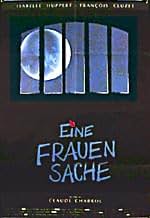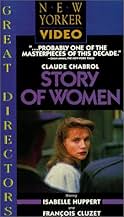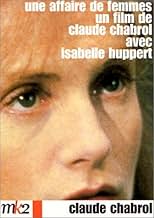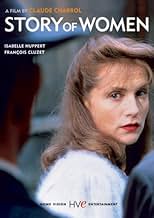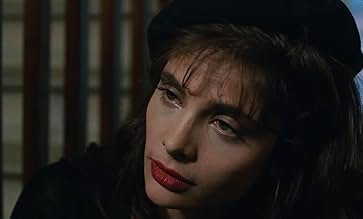Une affaire de femmes
- 1988
- Tous publics
- 1h 48m
IMDb RATING
7.5/10
6.2K
YOUR RATING
A housewife in Nazi-occupied France struggles to make ends meet when her husband returns home after being wounded in the war.A housewife in Nazi-occupied France struggles to make ends meet when her husband returns home after being wounded in the war.A housewife in Nazi-occupied France struggles to make ends meet when her husband returns home after being wounded in the war.
- Awards
- 14 wins & 8 nominations total
Featured reviews
Marie (Isabelle Huppert) helps women have abortions in Nazi-occupied France, which turns out to be an unexpected income. However, she was arrested and sentenced to death by the time's reactionary government, looking for public examples to give to the nation.
Marie Latour (in reality her real name was Marie-Louise Giraud), was the last woman to be guillotined in France. The film tells this tragic story with dry realism, both in terms of the dialogues and the era's accurate reconstruction.
The film was in competion at the Italian 1988 Venice Film Festival. Isabelle Huppert won the Coppa Volpi award for best female interpretation, while outside conservative Catholic associations clamoured for the film to be withdrawn from distribution, for Marie's desperate prayer before being beheaded, accused by them fanatic groups to be 'blasphemous'. The film was released anyway.
Marie Latour (in reality her real name was Marie-Louise Giraud), was the last woman to be guillotined in France. The film tells this tragic story with dry realism, both in terms of the dialogues and the era's accurate reconstruction.
The film was in competion at the Italian 1988 Venice Film Festival. Isabelle Huppert won the Coppa Volpi award for best female interpretation, while outside conservative Catholic associations clamoured for the film to be withdrawn from distribution, for Marie's desperate prayer before being beheaded, accused by them fanatic groups to be 'blasphemous'. The film was released anyway.
Though I had owned this on VHS (recorded off French TV), I only opted to check it out now – after acquiring the film in a version accompanied by English subtitles, on the occasion of its director's birthday. While not a typical effort (being a period melodrama and based on fact to boot), in retrospect, it is justly considered among Chabrol's finest.
Star Isabelle Huppert (in one of her best performances, playing an essentially unsympathetic if pitiable type) received the Best Actress award at the Venice Film Festival for her work here. Interestingly, I would 'meet' Chabrol there in 2004 where the winning film that year happened to deal with the exact same subject as STORY OF WOMEN – the controversy regarding the practice of abortion, i.e. Mike Leigh's VERA DRAKE! Co-star Francois Cluzet, who acts pretty much as second-fiddle to Huppert in this case, would eventually come into his own under Chabrol's guidance in the similarly excellent L'ENFER (1994). The film, however, also provides a notable showcase for Marie Trintignant in the role of Huppert's prostitute friend; again, the actress would subsequently be promoted to lead status for the same director's BETTY (1992), which I have just watched and reviewed.
STORY OF WOMEN, then, makes for compelling viewing in several different keys: as a character study (Huppert wants to be a singer, refuses to sleep with her ex-P.O.W. husband but then takes a much younger lover, of course offers her services to girls 'in trouble' and ultimately renounces her faith while in prison), as a look at war-torn France (though the Nazis are hardly ever in the foreground, the hardships endured by the locals obviously have a lot to do with how they are 'forced' to behave) and as a critique, in the vein of Costa-Gavras' movies, of the justice system (there is no doubt Huppert was at fault but the punishment meted out, to set an example and uphold the country's moral rectitude to counter the dishonor of occupation, was too extreme). Oddly enough, once the husband exposes her to the authorities for rather selfish reasons to begin with, he basically exits the picture and is never shown feeling any kind of remorse.
For the record, Chabrol had already treated a cause célèbre in VIOLETTE NOZIERE (1978; which I will get to soon in my ongoing marathon, since I am actually approaching it in reverse chronological order!) and would do so again in the recent A GIRL CUT IN TWO (2007; that I have already viewed and commented upon).
Star Isabelle Huppert (in one of her best performances, playing an essentially unsympathetic if pitiable type) received the Best Actress award at the Venice Film Festival for her work here. Interestingly, I would 'meet' Chabrol there in 2004 where the winning film that year happened to deal with the exact same subject as STORY OF WOMEN – the controversy regarding the practice of abortion, i.e. Mike Leigh's VERA DRAKE! Co-star Francois Cluzet, who acts pretty much as second-fiddle to Huppert in this case, would eventually come into his own under Chabrol's guidance in the similarly excellent L'ENFER (1994). The film, however, also provides a notable showcase for Marie Trintignant in the role of Huppert's prostitute friend; again, the actress would subsequently be promoted to lead status for the same director's BETTY (1992), which I have just watched and reviewed.
STORY OF WOMEN, then, makes for compelling viewing in several different keys: as a character study (Huppert wants to be a singer, refuses to sleep with her ex-P.O.W. husband but then takes a much younger lover, of course offers her services to girls 'in trouble' and ultimately renounces her faith while in prison), as a look at war-torn France (though the Nazis are hardly ever in the foreground, the hardships endured by the locals obviously have a lot to do with how they are 'forced' to behave) and as a critique, in the vein of Costa-Gavras' movies, of the justice system (there is no doubt Huppert was at fault but the punishment meted out, to set an example and uphold the country's moral rectitude to counter the dishonor of occupation, was too extreme). Oddly enough, once the husband exposes her to the authorities for rather selfish reasons to begin with, he basically exits the picture and is never shown feeling any kind of remorse.
For the record, Chabrol had already treated a cause célèbre in VIOLETTE NOZIERE (1978; which I will get to soon in my ongoing marathon, since I am actually approaching it in reverse chronological order!) and would do so again in the recent A GIRL CUT IN TWO (2007; that I have already viewed and commented upon).
Definitely one of director Claude Chabrol's best films, if not his best.
It is based upon a true story out of Nazi occupied France, and stars the incredible Isabelle Huppert (The Piano Teacher, 8 Women). She is supported by Marie Trintignant (Harrison's Flowers), who had her career cut short by an untimely death.
Huppert finds a way to feed her family. She performs abortions and rents out rooms to prostitutes. Everything seems to be going well for her, but her husband is not happy about the fact that he hasn't had any in 10 years, and she now has a lover - he turns her in.
France is now rid of the Germans and is trying to restore her morality. Unfortunately, Marie to be made an example.
Huppert was great, and Trintigant was also very good.
It is based upon a true story out of Nazi occupied France, and stars the incredible Isabelle Huppert (The Piano Teacher, 8 Women). She is supported by Marie Trintignant (Harrison's Flowers), who had her career cut short by an untimely death.
Huppert finds a way to feed her family. She performs abortions and rents out rooms to prostitutes. Everything seems to be going well for her, but her husband is not happy about the fact that he hasn't had any in 10 years, and she now has a lover - he turns her in.
France is now rid of the Germans and is trying to restore her morality. Unfortunately, Marie to be made an example.
Huppert was great, and Trintigant was also very good.
Claude Chabrol's "Une affaire de femmes" takes us back to the challenging times of World War II, exploring the life of Marie, portrayed with depth and complexity by Isabelle Huppert. Set against the backdrop of a war-torn France, the film delves into the moral intricacies of survival, collaboration, and the consequences of one woman's choices.
The narrative unfolds as Marie, left alone with her two children during the wartime, faces the grim reality of a defeated nation. Huppert's performance brings a nuanced portrayal of Marie as she navigates through a tumultuous period, discovering her unexpected skill in performing abortions, a secret source of income during these dire times.
The film refrains from passing moral judgment on Marie's actions, leaving room for the audience to grapple with the ethical complexities of her decisions. François Cluzet complements Huppert's portrayal with his role as Marie's husband, whose jealousy and actions set the stage for the unfolding tragedy.
Chabrol, a master of suspense and a seasoned storyteller, weaves a narrative that transcends the specifics of its wartime setting. The movie serves as a poignant commentary on the broader themes of collaboration, morality, and the resilience of the human spirit in the face of adversity.
"Une affaire de femmes" captures the essence of Claude Chabrol's ability to dissect societal norms and individual choices. The film, although set against the backdrop of WWII, resonates with timeless themes, leaving the audience with much to contemplate. Huppert's compelling performance, supported by a strong cast, makes this film a standout in Chabrol's body of work.
The narrative unfolds as Marie, left alone with her two children during the wartime, faces the grim reality of a defeated nation. Huppert's performance brings a nuanced portrayal of Marie as she navigates through a tumultuous period, discovering her unexpected skill in performing abortions, a secret source of income during these dire times.
The film refrains from passing moral judgment on Marie's actions, leaving room for the audience to grapple with the ethical complexities of her decisions. François Cluzet complements Huppert's portrayal with his role as Marie's husband, whose jealousy and actions set the stage for the unfolding tragedy.
Chabrol, a master of suspense and a seasoned storyteller, weaves a narrative that transcends the specifics of its wartime setting. The movie serves as a poignant commentary on the broader themes of collaboration, morality, and the resilience of the human spirit in the face of adversity.
"Une affaire de femmes" captures the essence of Claude Chabrol's ability to dissect societal norms and individual choices. The film, although set against the backdrop of WWII, resonates with timeless themes, leaving the audience with much to contemplate. Huppert's compelling performance, supported by a strong cast, makes this film a standout in Chabrol's body of work.
I'd like to focus on this film as a French film, not of the United States. If one has seen "La Chagrin et la Pitie," then one knows the legacy of this film. France was not perfect during WWII. Not everyone in France was part of the resistance, mainly, they were trying to survive. I think its an amazing film that sheds light on a crucial point in French history. Yes, it's about abortion and Chabrol does a great job ensuring his abortionist is less than perfect. That's a wonderful point he makes, that no one is perfect, not even the moral majority of the government. But, I come away from this film with the same questions that I get from "Lacombe, Lucien," which are: 'what would I have done?' And, please, don't Monday morning quarterback World War II.
Did you know
- TriviaBased upon the true story of Marie-Louise Giraud, with character names changed.
- SoundtracksLe Poème de l'Amour et de la Mer
Written by Ernest Chausson
- How long is Story of Women?Powered by Alexa
Details
- Release date
- Country of origin
- Official site
- Languages
- Also known as
- Story of Women
- Filming locations
- Coulommiers, Seine-et-Marne, France(interiors: women's prison)
- Production companies
- See more company credits at IMDbPro
Box office
- Gross US & Canada
- $438,483
- Runtime
- 1h 48m(108 min)
- Sound mix
- Aspect ratio
- 1.66 : 1
Contribute to this page
Suggest an edit or add missing content


